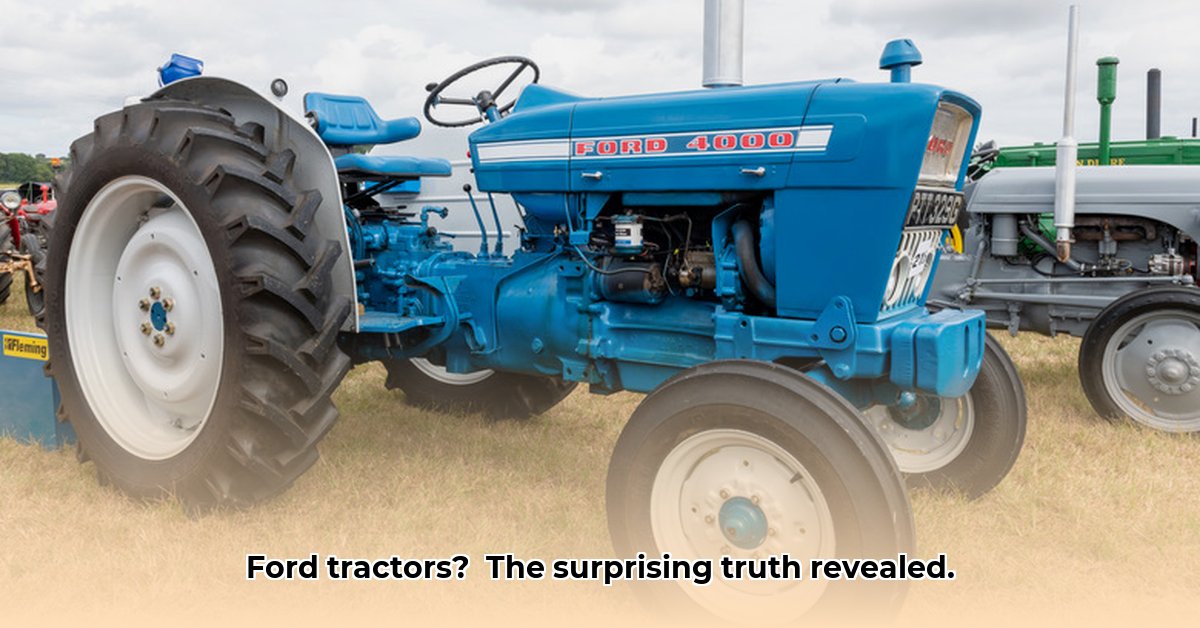
Does Ford Still Make Tractors?
The short answer is no. Ford, renowned for its automobiles, once held a significant place in the agricultural world, producing iconic tractors that revolutionized farming. However, in 1991, Ford divested its agricultural equipment division. This wasn't the end of the Ford tractor legacy, but rather a pivotal moment in the evolution of agricultural machinery. The story of Ford tractors provides a fascinating look at technological progress and its impact on farming practices, leading us to consider the modern emphasis on sustainable agriculture. For more on modern Ford-legacy tractors, check out this site on New Holland tractors.
Ford's Giant Leap for Farmers
Before the widespread adoption of tractors, farming was intensely labor-intensive, relying on manual labor and animal power. The arrival of Ford's Fordson tractor in the early 20th century was transformative. Its relatively low cost and surprising reliability made mechanized farming accessible to a broader range of farmers. This wasn't merely about increased speed; it represented a significant leap in efficiency, leading to larger harvests and more consistent yields. The Fordson, and its successor, the iconic Model 8N, became symbols of progress and profoundly impacted rural life. Their influence continues to resonate even today.
From Ford Blue to New Holland Red: A Merger's Story
Following the 1991 sale of its agricultural equipment division, Ford's tractor technology found a new home with New Holland, now a part of CNH Industrial. This wasn't simply an acquisition; it was a strategic transfer of knowledge and innovation. New Holland integrated Ford's proven designs and engineering advancements into its own product line. While new tractors no longer bear the Ford name, the spirit of Ford's engineering lives on in models like the New Holland T4 and T8 series, embodying the same principles of ruggedness and reliability. This evolution highlights the interconnectedness of agricultural technology companies and the continuity of innovation within the industry.
Sustainable Farming: More Than Just Fuel Efficiency
The question of whether Ford still makes tractors naturally leads to a larger discussion: the increasing importance of sustainable farming. Modern agriculture isn't solely about maximizing crop yields; it's equally about minimizing environmental impact. New Holland is at the forefront of this movement, developing machinery designed for environmentally responsible practices. This extends beyond fuel efficiency (though crucial), encompassing technologies for precise planting, optimized fertilizer application, and improved water management. The result is increased yields with reduced resource consumption and a smaller environmental footprint.
What Farmers Need to Consider
Choosing a tractor is not just about brand recognition; practicality is paramount. Farmers must weigh factors like cost, performance, fuel efficiency, and ease of maintenance. These considerations are especially vital for smaller farms with limited resources. The best choice depends on individual circumstances. A small-scale farmer might find the New Holland T4 series suitable, whereas a larger operation might require the increased power and advanced technology of the T8 series. Ultimately, it's about selecting the right tool for the specific farming operation.
Challenges and Opportunities on the Horizon
The transition from Ford to New Holland has presented challenges. Finding parts for older Ford tractors can be difficult, and skilled mechanics specializing in these older models may be scarce. However, the inherent durability of many Ford tractors presents opportunities. Many older models remain useful, especially with adaptations to meet modern sustainability goals. This includes retrofitting with modern components, adapting them for niche applications, or using them in less intensive farming practices.
A Future Shaped by Regulations and Innovation
Government regulations are significantly shaping the agricultural landscape. New safety standards and environmental regulations influence the design and production of all farm equipment. Companies like New Holland are actively adapting to these demands, constantly developing new technologies that promote responsible farming practices and meet evolving environmental requirements. The future of agriculture hinges on continuous innovation, particularly in sustainability and environmental protection.
Key Takeaways:
- Ford's influence on agriculture is undeniable, although they no longer manufacture tractors.
- New Holland continues Ford's legacy by building upon its engineering principles while incorporating modern technology.
- Sustainable farming practices are increasingly important in modern agriculture.
- The choice of tractor depends on individual farm needs and resources.
- Regulations and innovation are transforming the future of agriculture.